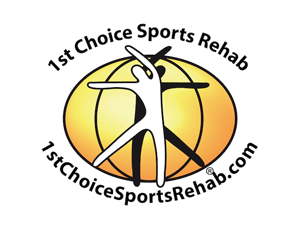RMR & VO2 Testing: the Ultimate Fitness Measures
At 1st Choice Sports Rehab, not only do we address chronic and acute injuries to athletes, but we also want our patients to be able to train efficiently and effectively. Two of the tools we use to help our athletes train are Resting Metabolic Rate Testing and VO2 Max Testing. You may have also heard of VO2 testing as Lactic Threshold Testing.
Resting Metabolic Rate Testing
RMR is a passive test measuring the oxygen (O2) to carbon dioxide (CO2) exchange rate while the patient is at rest wearing a mask. This test measures the number of calories a person would need to consume if they were sitting around doing nothing all day. The RMR can be a stand alone test as it also give an estimate of what your caloric burn would be with 30 minutes of moderate aerobic exercise. This test is a great option for those starting their journey to weight loss and who do not currently have a fitness routine, or for those who exercise at low to moderate levels a few times per week.
VO2 MAX testing
VO2 Max is an active test where the patient is running or cycling for up to 15 minutes, gradually building to a maximum effort, while hooked up to a mask that also measures the oxygen/carbon dioxide exchange rate. Essentially this test will help the athlete and their coach identify the athlete’s starting fitness level as well as their ideal heart rate training zones. With this information, the coach can properly design an annual training program and avoid the pitfalls of over training which often lead to fatigue and injury. We often test mid-season so training can accommodate any fitness gains.
As an endurance athlete myself, as well as a triathlon and swim coach, I highly recommend testing both the RMR and VO2 for athletes training for an event, for individuals trying to fine tune their caloric consumption, or for those seeking to quantify their fitness level.
Our research grade VO2 testing gives a more accurate caloric burn rate at different intensities of exercise. By combining the information from the two tests, a more targeted approach to nutritional planning can be achieved. We want to make sure the athlete is consuming enough calories throughout the day including the amount post workout so they avoid fatigue and unintended weight loss which can also lead to injuries.
Alternatively we may even need to curb their caloric intake to avoid weight gain. This is often a problem with athletes beginning a new sport of those returning to sport after an injury when their increased appetites can exceed their caloric burn – a time when that can’t quite justify that extra slice of pizza!
 Dr. Sasha Stolz has been a competitive swimmer for 25 years, a swimming coach for 10 years, a coach for Team in Training for the Leukemia and Lymphoma Society – and she is an IRONMAN. As a member of the Atlanta Sports Injury Specialists at 1st Choice Sports Rehab Center, she sees patients in our Decatur and Johns Creek offices. To schedule an appointment, call 404-377-0011.
Dr. Sasha Stolz has been a competitive swimmer for 25 years, a swimming coach for 10 years, a coach for Team in Training for the Leukemia and Lymphoma Society – and she is an IRONMAN. As a member of the Atlanta Sports Injury Specialists at 1st Choice Sports Rehab Center, she sees patients in our Decatur and Johns Creek offices. To schedule an appointment, call 404-377-0011.
Decatur Office
2545 Lawrenceville Hwy
Suite 100
Decatur, GA 30033
404-377-0011
fax 770-939-9353
Johns Creek Office
9810-B Medlock Bridge Rd
Suite 104
Johns Creek, GA 30097
404-300-9931
fax 770-939-9353
